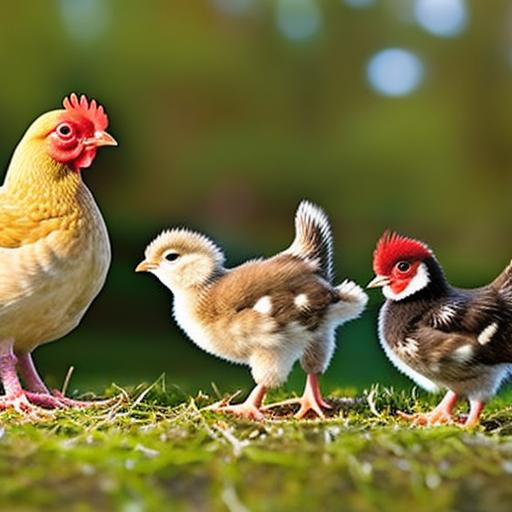Keeping baby chickens, also known as chicks, can be a rewarding and beneficial experience for many reasons. One of the main benefits of keeping baby chickens is the fresh eggs they provide. Chickens are known for their ability to lay eggs, and having your own flock means you will have a constant supply of fresh, organic eggs. These eggs are not only delicious but also packed with nutrients that are beneficial for your health.
Another benefit of keeping baby chickens is their natural pest control abilities. Chickens love to eat insects and other pests, such as slugs and snails. By allowing your chickens to roam freely in your yard or garden, they will help keep these pests under control without the need for harmful chemicals.
Keeping baby chickens can also be a fun hobby for the whole family. Children especially enjoy watching the chicks grow and develop into full-grown chickens. It can be a great learning experience for them to see the life cycle of a chicken up close and personal.
Key Takeaways
- Keeping baby chickens is important for a sustainable and self-sufficient lifestyle.
- Choosing the right chicken coop is crucial for the health and safety of baby chickens.
- Preparing the chicken coop with bedding, nesting boxes, and perches is essential for baby chickens’ comfort.
- Baby chickens should be fed a balanced diet of chick starter feed and given access to clean water at all times.
- Providing heat for baby chickens is necessary for their survival, and brooders are a safer option than heat lamps.
Choosing the Right Chicken Coop for Baby Chickens
When it comes to choosing a chicken coop for baby chickens, it is important to consider their size and growth rate. Baby chickens grow quickly, so it is essential to choose a coop that will provide enough space for them to grow comfortably. A coop that is too small can lead to overcrowding and stress among the chicks.
There are different types of coops available on the market, including wooden coops and plastic coops. Wooden coops are more traditional and provide a natural look, while plastic coops are lightweight and easy to clean. It is important to choose a coop that is sturdy and secure, with proper ventilation and protection from predators.
Preparing the Chicken Coop for Baby Chickens
Before bringing in baby chickens, it is crucial to clean and disinfect the chicken coop thoroughly. This will help prevent the spread of diseases and parasites. Remove any old bedding, droppings, and debris from the coop, and scrub the surfaces with a mild detergent or disinfectant.
After cleaning, it is important to provide bedding for the baby chickens. Straw or wood shavings are commonly used as bedding material. Bedding helps absorb moisture and provides insulation for the chicks. It is also important to provide nesting boxes for the chickens to lay their eggs.
Feeding Baby Chickens: What to Feed and How Often
Feeding baby chickens a balanced diet is crucial for their growth and development. They require a diet that is high in protein and nutrients to support their rapid growth. There are different types of feed available for baby chickens, such as chick starter and grower feed. These feeds are specially formulated to meet the nutritional needs of young chickens.
It is important to feed baby chickens regularly throughout the day. They should have access to feed at all times, as they have small stomachs and need to eat frequently. It is also important to provide fresh water at all times, as dehydration can be fatal for baby chickens.
Watering Baby Chickens: How Much Water Do They Need?
Providing clean water for baby chickens is essential for their health and well-being. Baby chickens need access to fresh water at all times, as they can become dehydrated quickly. On average, a baby chicken will drink about 1/4 cup of water per day.
There are different types of waterers available for baby chickens, such as gravity-fed waterers and nipple waterers. Gravity-fed waterers are easy to use and refill, while nipple waterers provide a constant supply of clean water without the risk of contamination.
Providing Heat for Baby Chickens: Heat Lamps vs. Brooders

Baby chickens require heat, especially in the first few weeks of life when they are unable to regulate their body temperature effectively. Providing heat is crucial for their survival and growth. There are different options for providing heat, such as heat lamps and brooders.
Heat lamps are commonly used to provide heat for baby chickens. They emit a steady source of heat and can be adjusted to the desired temperature. However, heat lamps can be a fire hazard if not used properly, so it is important to follow safety guidelines.
Brooders are another option for providing heat for baby chickens. They are enclosed spaces that provide a warm and safe environment for the chicks. Brooders can be homemade or purchased commercially and come in various sizes.
Cleaning the Chicken Coop: How Often Should You Do It?
Keeping the chicken coop clean is essential for the health and well-being of the baby chickens. A clean coop helps prevent the spread of diseases and parasites, which can be detrimental to the chicks’ health.
The coop should be cleaned regularly, with a thorough cleaning at least once a week. Remove any old bedding, droppings, and debris from the coop. Scrub the surfaces with a mild detergent or disinfectant to kill any bacteria or parasites.
It is also important to remove any wet or soiled bedding promptly, as it can lead to mold and bacterial growth. Regularly check the nesting boxes and clean them if necessary.
Protecting Baby Chickens from Predators
Protecting baby chickens from predators is crucial for their safety and survival. There are many predators that pose a threat to baby chickens, such as raccoons, foxes, and birds of prey.
To protect the coop from predators, it is important to use hardware cloth or wire mesh with small openings to cover windows and vents. This will prevent predators from entering the coop while still allowing for proper ventilation.
Electric fencing can also be used to deter predators from entering the chicken coop area. It provides a mild shock to predators that come into contact with it, discouraging them from trying to enter.
Socializing Baby Chickens: Why It’s Important
Socializing baby chickens is important for their overall well-being and development. Socialized chickens are more friendly and well-adjusted, making them easier to handle and interact with.
There are different ways to socialize baby chickens. Handling them gently and frequently from a young age helps them become accustomed to human contact. Providing toys and perches in the coop also helps stimulate their natural behaviors and keeps them entertained.
Tips for Keeping Baby Chickens Healthy and Happy
Keeping baby chickens can be a rewarding experience, but it requires proper care and attention. To keep baby chickens healthy and happy, it is important to choose the right chicken coop, prepare it properly, feed them a balanced diet, provide clean water, and protect them from predators.
Regular cleaning of the coop is essential to prevent the spread of diseases and parasites. Socializing baby chickens from a young age helps them become friendly and well-adjusted.
By following these tips and providing proper care, you can ensure that your baby chickens grow up to be healthy and happy members of your flock.
If you’re interested in learning about the best way to keep baby chickens, you may also find our article on chicken coop interior ideas helpful. Creating a comfortable and safe environment for your chicks is essential for their well-being and growth. From choosing the right bedding to providing adequate ventilation, this article offers practical tips and creative ideas to optimize your chicken coop’s interior. Check it out here for expert advice on raising happy and healthy baby chickens.
FAQs
What is the best way to keep baby chickens?
The best way to keep baby chickens is to provide them with a clean and safe environment, proper nutrition, and adequate space to move around.
What kind of housing do baby chickens need?
Baby chickens need a warm and dry shelter that is well-ventilated and protected from predators. A coop or brooder box with a heat lamp is ideal for keeping them safe and comfortable.
What should I feed my baby chickens?
Baby chickens need a balanced diet that includes a high-quality chick starter feed, which contains the necessary nutrients and protein for their growth and development. You can also supplement their diet with fresh fruits and vegetables.
How much space do baby chickens need?
Baby chickens need at least 2-3 square feet of space per bird in their coop or brooder box. As they grow, they will need more space to move around and exercise.
How often should I clean my baby chickens’ living area?
You should clean your baby chickens’ living area at least once a week to prevent the buildup of waste and bacteria. You should also change their bedding regularly to keep them clean and healthy.
What kind of bedding should I use for my baby chickens?
You can use a variety of bedding materials for your baby chickens, such as pine shavings, straw, or shredded paper. Make sure the bedding is clean, dry, and free of mold or mildew.
Meet Walter, the feathered-friend fanatic of Florida! Nestled in the sunshine state, Walter struts through life with his feathered companions, clucking his way to happiness. With a coop that’s fancier than a five-star hotel, he’s the Don Juan of the chicken world. When he’s not teaching his hens to do the cha-cha, you’ll find him in a heated debate with his prized rooster, Sir Clucks-a-Lot. Walter’s poultry passion is no yolk; he’s the sunny-side-up guy you never knew you needed in your flock of friends!







